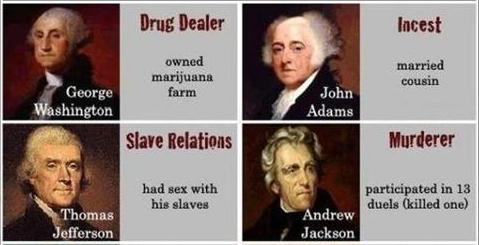
The hardest part of being a historian is accepting the fact that you may not like the answers you find.
I like to think that I’ve evolved into a more objective historian over the last few years. Ever since “Blog, or Die.” debuted back in 2009, I have become increasingly critical when analyzing the lives of our forefathers. As a result, my blog has become more popular and respected at a professional level. This has led to bigger gigs and better books. In many of my previous works (2000-2009), especially those written for the religious genre, I intentionally focused on the positive aspects of history believing it could be both educational and inspirational. I always believed that history was among our most cherished treasures, but learning about it meant nothing if we couldn’t apply it to our lives in some tangible, positive manner.
I still believe that. However, what I am learning nowadays is that “applying history to our lives in some tangible, positive manner” doesn’t always translate into a ‘DO.’ Many times it translates into a ‘DON’T’. In other words, there are many times when we should not admire or emulate these men. Far too often people try to separate the good from the bad when discussing our nation’s legacy. We don’t want to acknowledge that George Washington was a slaveholder, or that Mickey Mantle was a womanizing alcoholic. We only want to remember George’s honesty and Mickey’s homeruns.
Unfortunately looking through rose-colored glasses is NOT the way to preserve and present proper history. We must come to terms with the fact that many of our icons, like a Washington, Jefferson, Jackson or Lee, viewed women as inferior and African-Americans as property. We must accept the reality that they were often erroneous in their beliefs and conduct.
I used to get angry at other historians who were considered by many to be ‘naysayers’ or ‘overly-negative’ in their work. I now understand exactly where they are coming from. Historical figures have always been presented to us on a pedestal. For us to simply ignore their wrongs in favor of their rights does a great disservice to their memory. Worse off, we are being dishonest to ourselves and our readers when we only present the histories that we are comfortable with.
Admittedly, I was once guilty of this myself. When the vast majority of my work moved over into the secular realm, I immediately became conscious of my own preconceived notions. It was difficult at first, but I had to accept the darker sides of my idols. I also had to accept that they weren’t necessarily idols. I had to look at them honestly as men who could be both applauded and lauded. Only then did I truly see them.
That is what separates a historian from a history enthusiast. Removing our own personal attachment is the challenge. We become historians because we grow up loving history. We are star-struck by the men and women and events that we learned about. As we mature, we realize that there is usually more to the story. As historians, it’s that ‘more’ we should labor to find. After all, that's part of the story too.
Image source: PunditKitchen
ADDED 4/7: Yesterday’s post generated some interesting conversations between a few historian friends and me. The general consensus was that we can acknowledge historical figure’s flaws and weaknesses while honoring their accomplishments, character qualities, and positive contributions to our nation's history. At the same time we must be conscious not to allow our own personal biases influence how we analyze them. That’s a given. We also agreed that selective memory or hero worship distorts scholarship and inflates historical figures to mythical-like proportions. The reality is that most of our so-called “heroes” would never live up to our expectations. The strangest part of it all is that we will never meet any of these people, yet we often feel some kind of personal connection to them. So here you have the dilemma of the impersonal becoming personal. Finally we acknowledged that what may have been acceptable then may not be acceptable now and therefore we must keep things in context. I have a friend in the National Park Service who is considered a leading authority and penned one of the most critically-acclaimed Civil War books ever published. He once told me that he had absolutely no historical heroes and that he looked at people simply as they were. That puzzled me at the time, but now I get it.
Updated: Thursday, 7 April 2011 8:28 AM EDT
Permalink | Share This Post





